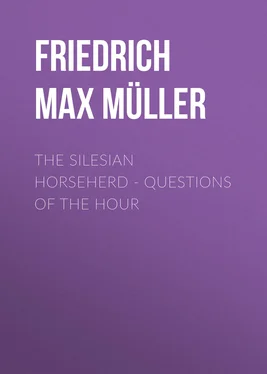Friedrich Max Müller - The Silesian Horseherd. Questions of the Hour
Здесь есть возможность читать онлайн «Friedrich Max Müller - The Silesian Horseherd. Questions of the Hour» — ознакомительный отрывок электронной книги совершенно бесплатно, а после прочтения отрывка купить полную версию. В некоторых случаях можно слушать аудио, скачать через торрент в формате fb2 и присутствует краткое содержание. Жанр: foreign_prose, foreign_religion, Философия, foreign_psychology, foreign_antique, на английском языке. Описание произведения, (предисловие) а так же отзывы посетителей доступны на портале библиотеки ЛибКат.
- Название:The Silesian Horseherd. Questions of the Hour
- Автор:
- Жанр:
- Год:неизвестен
- ISBN:нет данных
- Рейтинг книги:4 / 5. Голосов: 1
-
Избранное:Добавить в избранное
- Отзывы:
-
Ваша оценка:
- 80
- 1
- 2
- 3
- 4
- 5
The Silesian Horseherd. Questions of the Hour: краткое содержание, описание и аннотация
Предлагаем к чтению аннотацию, описание, краткое содержание или предисловие (зависит от того, что написал сам автор книги «The Silesian Horseherd. Questions of the Hour»). Если вы не нашли необходимую информацию о книге — напишите в комментариях, мы постараемся отыскать её.
The Silesian Horseherd. Questions of the Hour — читать онлайн ознакомительный отрывок
Ниже представлен текст книги, разбитый по страницам. Система сохранения места последней прочитанной страницы, позволяет с удобством читать онлайн бесплатно книгу «The Silesian Horseherd. Questions of the Hour», без необходимости каждый раз заново искать на чём Вы остановились. Поставьте закладку, и сможете в любой момент перейти на страницу, на которой закончили чтение.
Интервал:
Закладка:
Our knowledge of the entire system of Heraclitus is of course so fragmentary that we can only speak of this, as of many other points, with great caution. The same is true, although in a lesser degree, of the system of Anaxagoras. His nous , if we translate it by mind, is more comprehensive than Logos . We must not, however, suppose, that this nous bore a personal character, for Anaxagoras expressly states that it is a χρῆμα, a thing, even though he would have said that this nous regulated all things. Whether an impersonal mind is conceivable, was still at that time a remote problem. Even in Plato we cannot clearly determine whether he represented his nous as God in our sense, or as Sophia , wisdom, a word which with him often replaces nous . It is remarkable that in his genuine works Plato does not generally use the word Logos , and in Aristotle as well nous remains the first term, what we should call the divine mind, while Logos is the reason, the causal nexus, the οῦ ἔνεκα, therefore decidedly something impersonal, if not unsubjective.
Plato is the first who distinguishes between essence and being in the primeval cause, or, as we might say, between rest and activity. He speaks of an eternal plan of the world, a thought of the world, the world as a product of thought, inseparable from the creator, but still distinguishable from him. This is the Platonic world of “Ideas,” which lies at the foundation of the world perceivable by the senses, the phenomenal world. What is more natural or more reasonable than this thought? If the world has an author, what can we imagine as reasonable men, but that the thought, the plan of the world, belongs to the author, that it was thought, and thereby realised for the first time? Now this plan, this idea, was the inner Logos , and as every thought finds its immediate expression in a word, so did this one, which was then called the outer Logos. The outer was not possible without the inner, even as a word is impossible without mind and reason. But the inner Logos also first realises itself in the outer, just as the reasonable thought can only be made real in the word. This character of the Logos as thought and word, at once capable of distinction and yet undifferentiated and inseparable, is of the highest importance for Christian speculation; without an exact comprehension of it, we shall see that the relation of the Son to the Father as we find it explained by Clement and other fathers of the church, remains dark and misty. We have no concept without a word, and philology has shown us how every word, even the most concrete, is based on a concept. We cannot think of “tree” without the word or a hieroglyphic of some kind. We can even say that, as far as we are concerned, there is no tree, except in language, for in the nature of things there are only oaks or beeches, but not and never a tree. And what is true of tree is true of all words, or to speak with Plato, of all ideas, or to speak with the Stoics, of all Logoi . There are no doubt conjurers who pretend to be able to think without words, and even take no little pride in being able to perform this trick. They forget only too often that their inexpressible thoughts are nothing but obscure feelings, in fact, they do not even distinguish between presentation and idea, and forget that when we speak of words, we do not understand by them mere mimicry of sound or interjections, but only and exclusively intelligible words, that is, such as are based on concepts and are derived from roots. The old Greek philosophers, probably favoured by their language, appear never to have forgotten the true relation between Logos and Logos, and their thought finally resulted in a view of the world founded upon it. Although it is now the custom to speak slightingly of the later Platonists, we should always recognise that we owe to them the preservation of this, the most precious jewel out of the rich storehouse of Greek philosophy, that the world is the expression and realisation of divine thought, that it is the divine word expressed.
We cannot here enter into the various phases in which Plato and his followers presented these ideas. At times they are represented as independent of the Creator, as models, as golden statues, to which the creative mind looks up. Soon, however, they are conceived as thoughts of this mind, as something secondary, created, sometimes also as something independent, as much so as is the Son in relation to his Father. The whole Logos, with all ideas, became in this manner the first-born Son of the Creator, yet so that the Father could not be Father without the Son, or the Son without the Father, Son. All these distinctions, insignificant as they may appear from a purely philosophical point of view, demand attention because of the influence that they afterward exerted on Christian dogma, especially on that of the Trinity—a dogma which, however specifically Christian it may appear to be, must still in all its essential features be traced back to Greek elements.
It is certainly remarkable that Jewish philosophy also developed on very similar lines, of course not with the purity and exactness of the Greek mind, but still with the same object in view,—to bring the reason and wisdom recognised in nature into renewed connexion with their supernatural Jehovah. Through the Proverbs of Solomon and similar works the Jews were well acquainted with Wisdom, who says of herself (viii. 22 ff.): “The Lord possessed me in the beginning of his way, before his works of old. I was set up from everlasting, from the beginning, or ever the earth was.… Before the mountains were settled, before the hills was I brought forth.… When he prepared the heavens, I was there: when he set a compass upon the face of the depth.… Then I was by him, as a master workman: and I was daily his delight, rejoicing always before him.” These and similar thoughts were familiar to Jewish thinkers (see Proverbs viii. and ix., Job xxviii. 12, Ecclesiasticus i. 4), and it was natural that, in coming in contact with Greek philosophy, especially in Alexandria, they should seek to recognise again this traditional conception of divine Wisdom in the Logos of Greek philosophers. We see this most clearly in Philo, a contemporary of Christ, of whom it is often difficult to say whether he reasons more as a Greek or as a Jew. While the Greeks had almost lost sight of the bridge between the world and God by abstraction, the Jews, through mistaken reverence, had so far removed the Creator above his creation that on both sides the need of mediation or a mediator was deeply felt. The Jewish God was little better than the Epicurean. If the Epicureans taught that there probably is a God, but that the world is of no concern to Him, so among the Jews of the first century gnostic ideas prevailed, according to which not the highest but a subordinate God created and ruled the world. The task of creation seemed unworthy of the supreme God. Philo therefore seized the Stoic idea of the Logos or Logoi in order to bring his transcendental God again into relation with the visible world. The most important attributes and powers of God were hypostatised as beings who participated in the creation and government of the world. Philo's God first of all creates or possesses within himself a world that is conceived, an invisible world, 12 12 κόσμος νοητός, ἀόρατος.
which is also called the world of ideas 13 13 κόσμος ἰδεῶν.
or the idea of ideas. 14 14 ἰδέα τῶν ἰδεῶν.
These ideas are the types 15 15 παραδεἰγματα.
of all things, and the power by which God created them is often called Sophia or Epistêmê , wisdom or knowledge. 16 16 Philo, vol. I, p. 106.
This world of ideas in its entirety corresponds, as is readily seen, to the Greek Logos, the separate types to the Platonic ideas or the Stoic Logoi.
Интервал:
Закладка:
Похожие книги на «The Silesian Horseherd. Questions of the Hour»
Представляем Вашему вниманию похожие книги на «The Silesian Horseherd. Questions of the Hour» списком для выбора. Мы отобрали схожую по названию и смыслу литературу в надежде предоставить читателям больше вариантов отыскать новые, интересные, ещё непрочитанные произведения.
Обсуждение, отзывы о книге «The Silesian Horseherd. Questions of the Hour» и просто собственные мнения читателей. Оставьте ваши комментарии, напишите, что Вы думаете о произведении, его смысле или главных героях. Укажите что конкретно понравилось, а что нет, и почему Вы так считаете.












